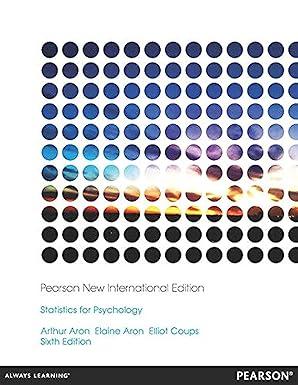11. Mize and Petit (1997) were interested in the impact of a mothers style of helping her...
Question:
11. Mize and Petit (1997) were interested in the impact of a mother’s style of helping her child understand social interactions on the child’s social life. These researchers arranged for 43 volunteer mothers and their 3- to 5-year-old children to be videotaped in three separate sessions. In the key session, the mothers and children were shown videotapes of other children behaving in hostile or rejecting ways with each other; then the mothers discussed the tapes with their children. Later,
the psychologists rated each mother for “social coaching”—such as how well the mothers helped the children understand what they had seen and suggested more positive ways to handle the situation. Tapes of the mothers and children playing together were rated for the mothers’ “responsive style”—warmth and attunement to the children. Finally, in the last session, tapes of the children solving a puzzle were rated for the mothers’ “nonsocial teaching”—how well they helped the children develop problem-solving skills. In another part of the study, the researchers had all the children answer questions about how much they liked the other children.
Using this information, they were able to come up with an overall measure of how much each child was liked, which they called “peer acceptance.”
The researchers hypothesized that the extent to which a mother was good at social coaching would predict her child’s peer acceptance. They also hypothesized that the relation of a mother’s social coaching to peer acceptance would hold up even in a multiple regression equation (prediction rule) that included nonsocial coaching and would also hold up in a regression equation that included responsive style. (That is, including the other predictors in the model would still leave a substantial unique association of social coaching with peer acceptance.)
The Peer Acceptance section of Table 12 shows their results. Equation 1 shows the results of the multiple regression analysis in which nonsocial teaching and social coaching are included as predictors of peer acceptance. Equation 2 shows the results of a separate multiple regression analysis in which responsive style and social coaching are included as predictors of peer acceptance. (In each case, standardized
Step by Step Answer:







